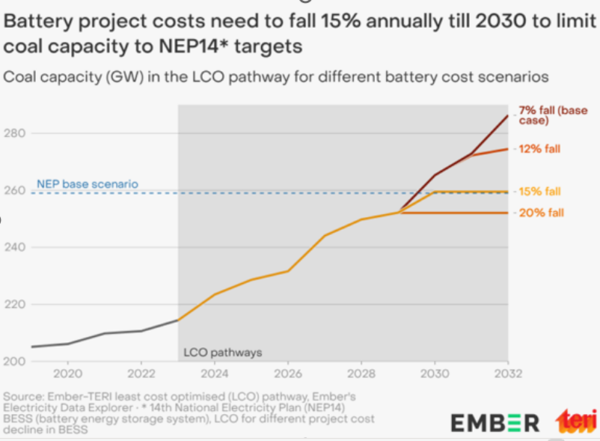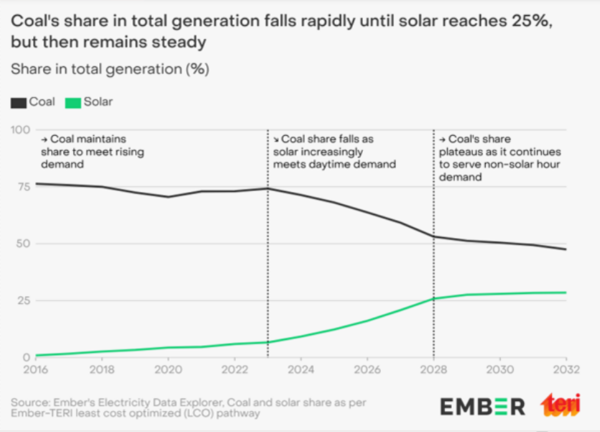A new report by the global think tank Ember and TERI highlights the crucial role of declining battery energy storage system (BESS) project costs in reducing coal dependency in the Indian power sector. It explores the least-cost-optimizd (LCO) pathways for the supply and storage mix required to meet the nation’s future electricity demand from 2024 to 2032. The analysts used Ember’s PyPSA-based co-optimization modelling for the study.
The report lays out different possible stages of a coal phase-down in India’s context: an initial period where coal generation growth slows as renewable energy (RE) is built more, followed by a period of coal generation plateau as RE plus storage becomes even more cheaper and finally a period of absolute decline in coal generation as RE plus storage becomes more cost-effective than the existing coal plants.

The report finds that if BESS costs continue to decline at the current rate of 7% annually, the least-cost pathway for India’s power transition will see coal generation plateauing until 2032, while additional coal capacity may still be needed to meet demand during non-solar hours. This is mainly because slow storage growth will hinder sustained RE growth once solar’s share in India’s power mix crosses 25%. And if BESS costs fall 15% every year on an average, it would enable India to potentially limit its coal capacity to the 14th National Electricity Plan projection of 260 GW by 2032.

A.K. Saxena, senior director of electricity and renewables at TERI, “Energy storage holds the key for decarbonisation of electricity generation; reduction in the cost of various storage options would accelerate the energy transition in economies.”
BESS costs, excluding the cost of financing, currently stand close to Rs 13 million/ MWh. The LCO pathway indicates no new coal additions might be needed if this drops to around Rs 6 million/MWh. While recent declines in BESS costs have been significant, they need to fall by more than 50% from current levels for the least-cost pathway to favour no new coal additions, especially for meeting non-solar demand.
Neshwin Rodrigues, the electricity policy analyst at Ember said, “Planners will now need to consider strategies for shifting solar generation to non-solar hours to ensure that the pace of the transition does not slow down. Therefore, while declining battery storage costs are crucial, it’s also important to focus on increasing annual renewable energy capacity, securing necessary financing, and enhancing coal plant flexibility.”
Ember’s analysis suggests that power system planning will be more critical in the coming years as the least-cost pathway for India’s power sector transition will shift drastically as battery costs decline further. By 2032, renewable energy could meet as much as 83% of electricity demand during daytime, but only 38% during non-solar hours due to current storage limitations. However, building any new coal capacity comes with risks and challenges. Coal capacity would need to ramp up and down a lot more and if BESS costs fall faster than anticipated, these new plants would face severe lock-in and underutilisation risks.
Nayeem Khan, the research associate at TERI highlighted: “Accelerated growth in solar and wind, development of pumped hydro projects, and cost-competitive low-carbon technologies like BESS are essential for India to avoid new coal capacity. “
The report underscores the importance of policy interventions like viability gap funding to facilitate the necessary decline in battery costs. Additionally, strategies for shifting solar generation to non-solar hours and enhancing coal plant flexibility are crucial to maintaining the pace of the transition.
This content is protected by copyright and may not be reused. If you want to cooperate with us and would like to reuse some of our content, please contact: editors@pv-magazine.com.









By submitting this form you agree to pv magazine using your data for the purposes of publishing your comment.
Your personal data will only be disclosed or otherwise transmitted to third parties for the purposes of spam filtering or if this is necessary for technical maintenance of the website. Any other transfer to third parties will not take place unless this is justified on the basis of applicable data protection regulations or if pv magazine is legally obliged to do so.
You may revoke this consent at any time with effect for the future, in which case your personal data will be deleted immediately. Otherwise, your data will be deleted if pv magazine has processed your request or the purpose of data storage is fulfilled.
Further information on data privacy can be found in our Data Protection Policy.